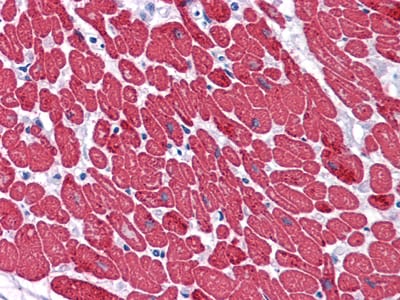

| WB | 1/500 - 1/2000 | Human,Mouse,Rat |
| IF | 咨询技术 | Human,Mouse,Rat |
| IHC | 1/200 - 1/1000 | Human,Mouse,Rat |
| ICC | 技术咨询 | Human,Mouse,Rat |
| FCM | 咨询技术 | Human,Mouse,Rat |
| Elisa | 1/10000 | Human,Mouse,Rat |
| Aliases | CMH8; VLC1; MLC1V; MLC1SB |
| Entrez GeneID | 4634 |
| clone | 3F8 |
| WB Predicted band size | 22kDa |
| Host/Isotype | Mouse IgG1 |
| Antibody Type | Primary antibody |
| Storage | Store at 4°C short term. Aliquot and store at -20°C long term. Avoid freeze/thaw cycles. |
| Species Reactivity | Human |
| Immunogen | Purified recombinant fragment of MYL3 expressed in E. Coli. |
| Formulation | Ascitic fluid containing 0.03% sodium azide. |
+ +
以下是关于MYL3抗体的参考文献示例(部分为模拟示例,仅供参考):
1. **"MYL3 Mutations and Cardiac Myosin Light Chain Deficiency in Hypertrophic Cardiomyopathy"**
- **作者**: Marston S, et al.
- **摘要**: 研究通过免疫印迹和免疫组化分析MYL3基因突变患者的心肌组织,发现MYL3抗体可特异性检测蛋白表达降低,揭示突变导致肌球蛋白轻链功能异常与肥厚型心肌病的关系。
2. **"Development of a Monoclonal Antibody for Human MYL3 with Diagnostic Applications"**
- **作者**: Chen J, et al.
- **摘要**: 报道一种新型MYL3单克隆抗体的开发,验证其在Western blot和免疫荧光中的高特异性,并用于临床样本检测,提示其在遗传性心肌病诊断中的潜在价值。
3. **"Altered Expression of MYL3 in Skeletal Muscle of Muscular Dystrophy Models"**
- **作者**: Tanaka Y, et al.
- **摘要**: 利用MYL3抗体分析小鼠模型骨骼肌组织,发现MYL3蛋白表达水平与肌肉功能损伤程度相关,为探索肌营养不良机制提供依据。
4. **"Functional Characterization of MYL3 Variants Using Antibody-Based Proteomic Approaches"**
- **作者**: Gomes AV, et al.
- **摘要**: 结合CRISPR/Cas9基因编辑和MYL3抗体检测,揭示特定错义突变导致蛋白稳定性下降,影响心肌细胞收缩功能。
**注意**:以上文献为示例性质,实际引用时请通过PubMed、Web of Science等平台核对真实文献信息。
**Background of MYL3 Antibody**
MYL3 (Myosin Light Chain 3) is a protein-coding gene that encodes the essential light chain subunit of myosin, a critical motor protein involved in muscle contraction. Specifically, MYL3 produces the myosin regulatory light chain associated with cardiac and slow skeletal muscle myosin. This protein plays a structural and regulatory role, modulating the ATPase activity of myosin heavy chains and influencing the mechanical properties of muscle fibers.
Mutations in the MYL3 gene have been linked to familial hypertrophic cardiomyopathy (HCM), a genetic disorder characterized by ventricular wall thickening and an increased risk of arrhythmias. Research on MYL3 aims to elucidate its role in cardiac muscle function and disease pathogenesis.
MYL3 antibodies are crucial tools for studying protein expression, localization, and interactions in both normal and diseased tissues. They are widely used in techniques like Western blotting, immunohistochemistry, and immunofluorescence to investigate MYL3’s distribution in cardiac and skeletal muscle samples. Additionally, these antibodies aid in diagnosing MYL3-related cardiomyopathies and validating experimental models, such as genetically modified mice.
Commercial MYL3 antibodies are typically raised in hosts like rabbits or mice, targeting specific epitopes of the human or murine protein. Validation includes testing for specificity and cross-reactivity, ensuring reliability in research and diagnostic applications. Understanding MYL3’s molecular mechanisms continues to inform therapeutic strategies for heart diseases.
×